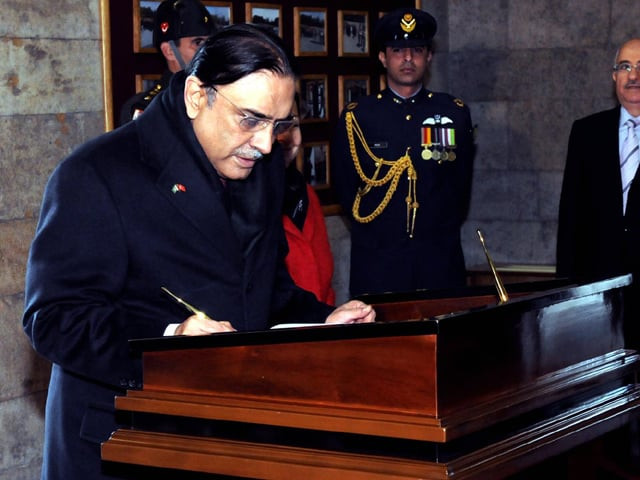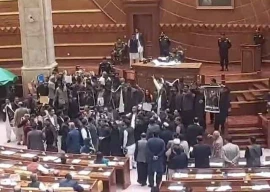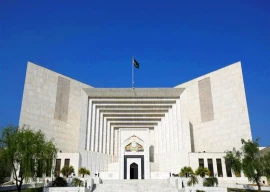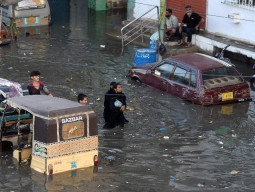
A recently released WikiLeaks cable citing a meeting between President Asif Ali Zardari and Nato’s North Atlantic Council, said “the meeting was something of a lost opportunity,” because while President Asif Zardari was “theatrical” and made “colourful use of metaphors” to push Pakistan’s case for financial and development assistance from Nato, he was “unable to engage [Nato permanent representatives] in a strategic level discussion” because “his interventions were impassioned but lacked substance … and he failed to answer PermReps’ questions or make specific requests of [Nato].”
The questions were quite straightforward, something one would expect the head of a beleaguered nation to be able to answer. Some allies asked “what specific assistance could Nato provide, such as assets to help alleviate the current humanitarian crisis of Internally Displaced Persons.” Others asked “what training Nato might be able to provide Pakistan and how Zardari’s government planned to follow military operations in the northwest with reconstruction and development efforts.”
The president, however, reverted to “continuous invocations of his late wife” and talked about how he “appointed his son to the chairmanship of the Pakistan Peoples’ Party.”
The exchange, albeit embarrassing, should not be unexpected. Politicians are not the go-to people if you want specific answers, especially in a country where the bureaucracy holds the key to all development work on the ground. Projects are conceived and developed in labyrinthine corridors of ministries by bureaucrats, both at the provincial and federal levels.
Clueless politicians
Politicians have “a very limited role” in conceiving or designing specific projects, says public policy analyst and writer Raza Ahmad Rumi. And donors, who are essentially bureaucrats themselves, don’t like dealing with politicians because they are difficult and have little technical expertise. Donors like fellow bureaucrats because they get their jargon, and therefore the entire process of designing, conceiving and funding a project usually bypasses public representatives.
The ministers probably nod when presentations are made to them for approval, but they have little clue about what ought to be prioritised and selected, beyond what the bureaucrats sell to them. Not all public representatives are clueless, however, insists Kaiser Bengali, economist and adviser to the Sindh chief minister.
Of 168 provincial ministers in Sindh, about 25 to 30 are extremely active and involved in the designing and conception of development projects, he adds.
Instead of building small district level roads, we asked all MPs to submit their requirements and build up a large provincial-level project based on all their inputs, Bengali says, citing an example of the involvement of public representatives in development process.
The process, however, was an exception, and not the norm, he admitted.
Donors and politicians’ short-sightedness
Designing projects to submit to donors is a difficult and resource consuming process, says Rumi and the Pakistani state lacks the capacity to be able to churn out a well-designed project menu for donors to choose from.
Meanwhile, Pakistan’s economic managers, especially at the federal level, prefer asking for concessional loans and budgetary support for various programmes such as Watan cards or the Benazir Income Support Programme, says Haris Gazdar, director and senior researcher at the Collective for Social Science Research.
Meanwhile, donors also prefer budgetary support because it involves less hassle and vague conditions, adds Bengali.
But foreign governments aren’t all altruistic. They are aware of the government’s limited capacity to carry out projects with large impact but they’re also not interested in building the state’s capacity to be able to do that. They want to spend money and look good while doing it.
The solution, therefore, is usually to use their own agencies such as USAID or UKAID that use independent consultancy firms to design, conceive and implement the projects. Either way, the government plays little role besides watching from the sidelines or giving an occasional nod.
What about the president?
This does not, however, absolve the president of his “ill-preparedness.” He was speaking to political representatives, not technical experts, at that meeting.
Besides, politicians are responsible for policy-making, says Gazdar, and as such the head of the state should be able to articulate what is required by the state, in case a donor asks.
It really depends on public representative’s initiative, says Bengali.
He insists the president is well informed of specific needs but does not carry a shopping list with him at all times. The occasion mentioned in the leak, therefore, is a specific one where he must have
been caught off-guard, he adds to the president’s defence.
Published in The Express Tribune, May 22nd, 2011.


















COMMENTS
Comments are moderated and generally will be posted if they are on-topic and not abusive.
For more information, please see our Comments FAQ